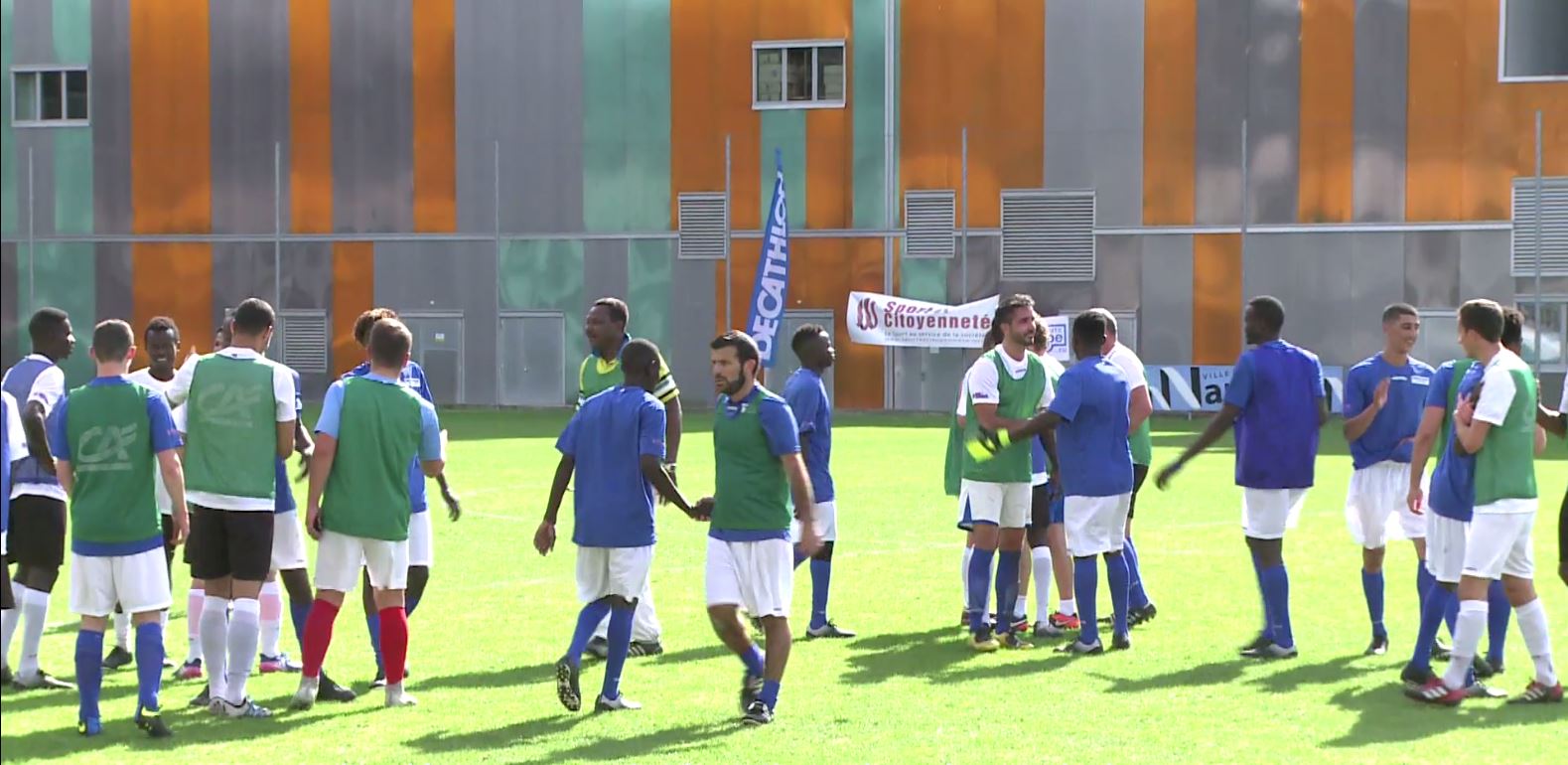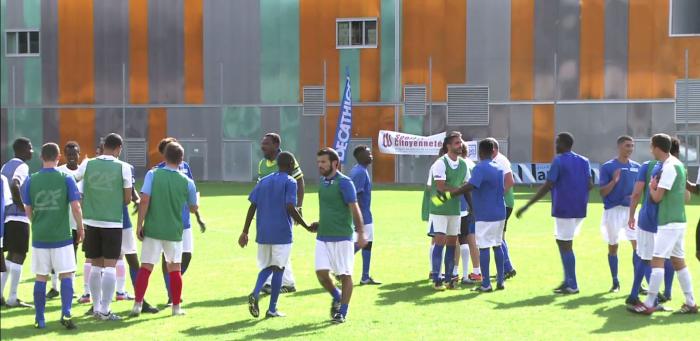
Football Unites, Racism Divides
Football Unites, Racism Divides
On 18 May, a French Ligue 2 play-off game between Ajaccio and Le Havre had to be abandoned following incidents that took place ahead of kick-off. When Le Havre’s team bus arrived at the stadium, some 150 Ajaccio fans blocked the road, launched stones at the bus. Reports were made about racist insults addressed towards the Le Havre players and staff. The game was postponed to 20 May and took place under stressed conditions.
These incidents show us how racism is still very present in football. In the light of these events, the ‘Football Unites, Racism Divides’ conference that was organised on 23 May 2018 by the Sport Intergroup of the European Parliament made a lot of sense. The conference took place in the context of the ‘Not in my game’ campaign, which aims at signalling that there is no room for hate in our public life, with the support of European politicians and athletes.

The first session gathered MEPs Bogdan Wenta ,Cécile Kyenge and Virginie Rozière who displayed the European Parliament’s engagement to tackle discrimination and the role football can have to do so. Football stadiums often reflect society, recent worrying incidents therefore show that racism is very present. The European Parliament has in fact adopted a resolution on an integrated approach to Sport Policy: good governance, accessibility and integrity on 2 February 2017.[1] In this resolution, the Parliament strongly condemns all forms of racism, discrimination, hooliganism and violence in sport, both on and off the field.
On the day of the conference, the Council of the European Union adopted conclusions on promoting the common values of the EU through sports. The Bulgarian Presidency gathered Aleksander Ceferin, President of UEFA and Tibor Navracsics, Commissioner for Education, Culture, Youth and Sports to debate on the sustainability of sport. Among other elements, the conclusions underlined the role of sport as a tool to combat phenomena such as xenophobia, racism and intolerance.
Tackling racism and discrimination is also a priority for the European Commission who is offering the opportunity to organisations to develop networks of innovative practices in the field of sport. 30% of these collaborative partnerships concern anti-discrimination, the fight against racism and social inclusion. Meanwhile, the Commission recently launched a call for projects that aims at integrating refugees through sport. The Commission is convinced that sport is a factor of integration, as Yves Le Lostèque, Head of the Sport Unit, explained.
The Commission’s Erasmus+ programme has been supporting projects targeting the promotion of tolerance, non-discrimination and social inclusion since 2014, with special attention to projects involving refugees, asylum seekers and migrants. One of the projects that has been supported by the Commission is Kraainem Football Club’s initiative to welcome refugees, as Yves Le Lostèque recalled. In three years, Kraainem FC has welcomed more than 1500 young refugees and asylum seekers, giving them the opportunity to join their youth teams and offering them language courses. The Commission has recently announced that the successor of the Erasmus+ programme will have a budget of 30 billion euros for 2021-2027, which is more than double the budget from 2014-2020.[2]
The Fare network (Football Against Racism in Europe) has actively supported the integration of refugees through football. It has created a database of grassroots organisations that have been giving opportunities to refugees.[3] Since 2013, Fare has also been systematically monitoring incidents of discrimination in UEFA and FIFA international competitions. Pavel Klymenko, who is co-ordinating the FARE Observer system, presented some recent observations. Although there is a general decrease in the number of incidents, we can observe some worrying trends. There is an obvious connection between the political and societal sensibilities and the activities in football stadiums. Far right groups have lately been bringing anti-migrant signs in Poland, Hungary and Italy to football games. They cooperate with fans and organise actions against other team fans, not because of the football rivalry, but because of racial issues.
Fare network has also been working closely with UEFA in the framework of the ‘No to racism’ campaign. Since 2001, they have been organising events, publishing documents and sending messages of zero tolerance for any form of racism and discrimination, in favour of more respect for diversity. The No to Racism message appears on team captain’s armbands and on banners, which are prominently displayed on the pitch during international UEFA completion games. A video containing players’ testimonials supporting the campaign is also regularly shown in stadiums and on television during broadcasting.
Patrick Gasser elaborated on UEFA’s zero tolerance and the three step principle that referees need to apply when they notice something, going from interrupting the game and asking for a public announcement to abandoning the match. Luckily, the third step hasn’t been reached yet, however, referees have been trained towards the Russia World Cup in case serious incidents should happen. These measures aim at directly condemning incidents like the shocking images of SS Lazio Roma fans who posted stickers with an image of Anne Frank wearing a jersey of their rival AS Roma, as reported by Fabio Appetiti.
The second session of the conference focused on antisemitism in football, which has been growing more during these last months than during the past ten years, according to British MP John Mann, who opened the discussion. MEP Heinz Becker, who is chairing the EP Working Group on Antisemitism (WGAS), said how important it is to be consequent in our actions and constantly condemn antisemitic statements. It is also our responsibility to not give a place to antisemitism in European football stadiums.
Simon Taylor and Dave Rich talked on behalf of the Chelsea Foundation, presenting their campaign ‘Say no to antisemitism’. The campaign puts a lot of emphasis on education of fans and students and the club organises regular workshops in schools. Similar initiatives are taken by Borrusia Dortmund, represented by Daniel Lörcher, Head of Fan Relations. Many projects are set up by the club to tackle the influence of extreme right movements, which tried to enter the club through the hooligan movement and to import antisemitism in football stadiums. Visits to Auschwitz are being organised to provide knowledge and to connect fans from different groups.
Nonetheless, the relationship between football fans and Judaism is not always a hate story, as Willem Wagenaar, from the Anne Frank Stichting explained. He gave the example of the Dutch club Ajax Amsterdam, whose fans like to call themselves ’Superjews’, even though the number of Jewish Ajax fans isn’t particularly high. The nickname comes from the neighbourhood of the former stadium, which used to have a consequent Jewish population. Another similar example are Tottenham Hotspur fans who call themselves ‘Yid Army’, using the term ‘Yid’, which is an insult to Jews. However, they use it proudly as being part of their identity.
Racism and discrimination in sport have always been priority areas of attention for Sport and Citizenship. Our think tank regularly produces documents with updates on the fight against racism in sport.[4] We have even produced a whole issue of our scientific journal to Sport and Diversity.[5] We ask for a stronger and more efficient sport legislation sanctioning misbehaviour at the European and the national level. Sport federations and professional clubs are spurred to develop comprehensive educational programmes to raise public awareness on these topics in order to eradicate racism and discrimination.
[1] http://www.europarl.europa.eu/sides/getDoc.do?pubRef=-//EP//NONSGML+TA+P8-TA-2017-0012+0+DOC+PDF+V0//EN
[2] https://ec.europa.eu/commission/sites/beta-political/files/budget-proposals-investing-people-may2018_en.pdf
[3] http://farenet.org/campaigns/refugees-football-database/
[4] https://sportetcitoyennete.com/wp-content/uploads/2018/02/Note-de-synthèse-Lutte-contre-le-racisme-Think-tank-Sport-et-Citoyenneté.pdf
[5] https://sportetcitoyennete.com/en/articles-en/journal-n30-sport-and-diversity
